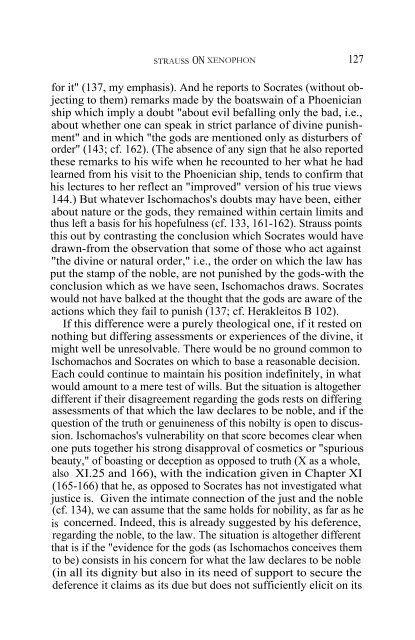Strauss on Xenophon's Socrates Xenophon's Socratic Discourse: An ...
Strauss on Xenophon's Socrates Xenophon's Socratic Discourse: An ...
Strauss on Xenophon's Socrates Xenophon's Socratic Discourse: An ...
Create successful ePaper yourself
Turn your PDF publications into a flip-book with our unique Google optimized e-Paper software.
STRAUSS ON XENOPHON 127<br />
for it" (137, my emphasis). <strong>An</strong>d he reports to <strong>Socrates</strong> (without objecting<br />
to them) remarks made by the boatswain of a Phoenician<br />
ship which imply a doubt "about evil befalling <strong>on</strong>ly the bad, i.e.,<br />
about whether <strong>on</strong>e can speak in strict parlance of divine punishment"<br />
and in which "the gods are menti<strong>on</strong>ed <strong>on</strong>ly as disturbers of<br />
order" (143; cf. 162). (The absence of any sign that he also reported<br />
these remarks to his wife when he recounted to her what he had<br />
learned from his visit to the Phoenician ship, tends to c<strong>on</strong>firm that<br />
his lectures to her reflect an "improved" versi<strong>on</strong> of his true views<br />
144.) But whatever Ischomachos's doubts may have been, either<br />
about nature or the gods, they remained within certain limits and<br />
thus left a basis for his hopefulness (cf. 133, 161-162). <str<strong>on</strong>g>Strauss</str<strong>on</strong>g> points<br />
this out by c<strong>on</strong>trasting the c<strong>on</strong>clusi<strong>on</strong> which <strong>Socrates</strong> would have<br />
drawn-from the observati<strong>on</strong> that some of those who act against<br />
"the divine or natural order," i.e., the order <strong>on</strong> which the law has<br />
put the stamp of the noble, are not punished by the gods-with the<br />
c<strong>on</strong>clusi<strong>on</strong> which as we have seen, Ischomachos draws. <strong>Socrates</strong><br />
would not have balked at the thought that the gods are aware of the<br />
acti<strong>on</strong>s which they fail to punish (137; cf. Herakleitos B 102).<br />
If this difference were a purely theological <strong>on</strong>e, if it rested <strong>on</strong><br />
nothing but differing assessments or experiences of the divine, it<br />
might well be unresolvable. There would be no ground comm<strong>on</strong> to<br />
Ischomachos and <strong>Socrates</strong> <strong>on</strong> which to base a reas<strong>on</strong>able decisi<strong>on</strong>.<br />
Each could c<strong>on</strong>tinue to maintain his positi<strong>on</strong> indefinitely, in what<br />
would amount to a mere test of wills. But the situati<strong>on</strong> is altogether<br />
different if their disagreement regarding the gods rests <strong>on</strong> differing<br />
assessments of that which the law declares to be noble, and if the<br />
questi<strong>on</strong> of the truth or genuineness of this nobilty is open to discussi<strong>on</strong>.<br />
Ischomachos's vulnerability <strong>on</strong> that score becomes clear when<br />
<strong>on</strong>e puts together his str<strong>on</strong>g disapproval of cosmetics or "spurious<br />
beauty," of boasting or decepti<strong>on</strong> as opposed to truth (X as a whole,<br />
also XI.25 and 166), with the indicati<strong>on</strong> given in Chapter XI<br />
(165-166) that he, as opposed to <strong>Socrates</strong> has not investigated what<br />
justice is. Given the intimate c<strong>on</strong>necti<strong>on</strong> of the just and the noble<br />
(cf. 134), we can assume that the same holds for nobility, as far as he<br />
is c<strong>on</strong>cerned. Indeed, this is already suggested by his deference,<br />
regarding the noble, to the law. The situati<strong>on</strong> is altogether different<br />
that is if the "evidence for the gods (as Ischomachos c<strong>on</strong>ceives them<br />
to be) c<strong>on</strong>sists in his c<strong>on</strong>cern for what the law declares to be noble<br />
(in all its dignity but also in its need of support to secure the<br />
deference it claims as its due but does not sufficiently elicit <strong>on</strong> its

















